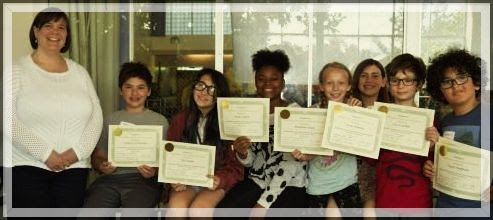Why Teach Debate to Kids?
By DebateAble Coach, Sarah Yatsko
As for many, the run up to the 2016 presidential election laid bare for me the fragile state of civil discourse. My social media feeds were full of friends and family members dismissing one another based on which candidate they supported or where they stood on a particular issue. There was little engagement, effort to understand or thoughtful debate.
 |
|
Coach Sarah and her first year DebateAble club
|
In the middle of the pre-election frenzy, my eye caught a flyer hanging in the hallway of my children's Seattle elementary school that read, "Debate Coach Needed." So I signed up. Teaching children how to listen to one another and respectfully disagree seemed like the perfect antidote to the political climate. My hope was to share the joy and the power of vigorous debate.
What I did not expect is how much my DebateAble students would teach me.
Two years in and five sessions later, I have coached dozens of 4th and 5th graders. Some admitted to me that they did not want to take debate, but had parents who thought they should. These students helped me hone an ability to communicate the value of debate to kids and to keep them engaged and debating, as I learned that even the most reluctant debater can not resist the allure of making an argument that only they would think to make. But most of my students enter their first class eager to learn how to be a good debater. This is true for even the most unlikely candidates.
During registration in my second year of teaching debate I received an email from a parent. Her son, I'll call him Marcus, told her he wanted to join debate club but she was reluctant. She explained that he was a hard worker, but she worried that his frequent leaps of logic may make it difficult for him to fully participate or be an asset to a team. I encouraged her to enroll Marcus and promised to keep her posted on his progress. As it turned out, Marcus had no difficulty forming logical arguments - in fact, much of what he argued was strongly reasoned and compelling. However, he was deeply uncomfortable speaking in front of others. Week after week, we worked on the public speaking skills that DebateAble calls "conduct": making eye contact, speaking with more volume, and adding inflection and tone.
And Marcus began to change.
His confidence soared as he became eager to present in front of the class. That spring, at DebateAble's Citywide Tournament, I watched as Marcus made compelling and beautifully delivered arguments, and even heard one judge remark how well Marcus and his teammates worked together.
Several months later Marcus' mother sent me a video of Marcus speaking in front of a group of students and parents. In the video he begins, "Yes, you know my name is Marcus and you think that I am one kid who is ordinary, but that is not true. I am not ordinary. I have Autism." His voice shakes a bit, but he steadies himself and looks right at his audience and presses on. Watching him, it is impossible not to be moved by his candor and bravery. And looking back on his progress, I realize that Marcus taught me how far we can push ourselves beyond what is comfortable or what others believe we are capable of doing.
His mom later shared that Marcus had told her "Debate was a life changing experience for me."
I still hope that my students leave my class better able to listen to and respectfully disagree with one another, but I now understand that it isn't my job to teach them this, only to provide them with the time and tools to discover they have had it in themselves all along.
I still hope that my students leave my class better able to listen to and respectfully disagree with one another, but I now understand that it isn't my job to teach them this, only to provide them with the time and tools to discover they have had it in themselves all along.
Categories
- News (4)
- Empathy (3)
- Teachers, Schools, Districts (7)
- Parents & Homeschool (9)
- After-School Youth Organizations (5)
- Seattle Area Schools Debate Clubs (2)
- Civil Discourse (6)
- At-Home Curriculum (8)
- Online elementary education (6)
- Virtual Classes (4)
- Virtual Teaching (1)
- Online Teaching (3)
- DebateAble Table Newsletter Series (7)

0 comments
Leave a comment
Please log in or register to post a comment